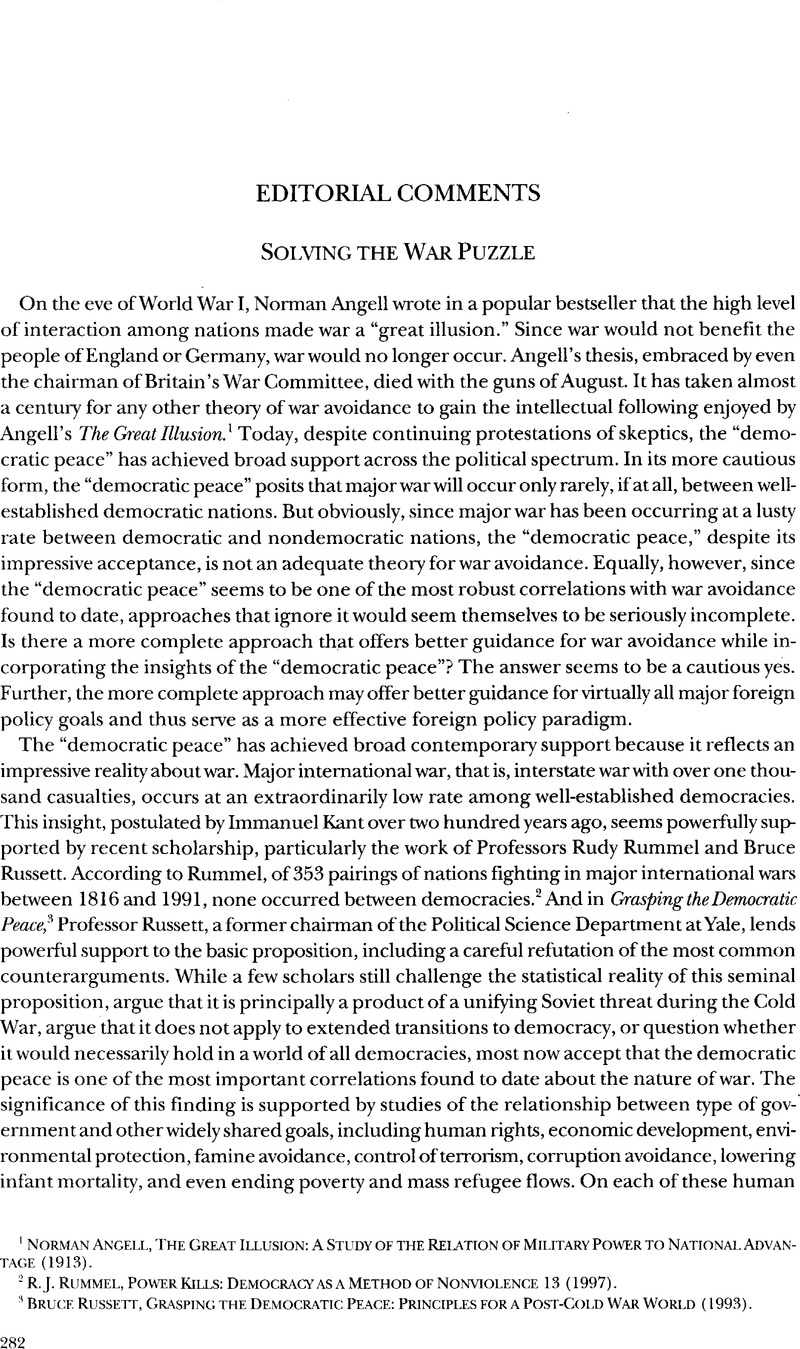Article contents
Solving the War Puzzle
Published online by Cambridge University Press: 27 February 2017
Abstract

- Type
- Editorial Comments
- Information
- Copyright
- Copyright © American Society of International Law 2003
References
1 Angell, Norman, The Great Illusion: a Study of the Relation of Military Power to National Advantage (1913)Google Scholar.
2 Rummel, R. J., Power Kills: Democracy as a Method of Nonviolence 13 (1997)Google Scholar.
3 Russett, Bruce, Grasping the Democratic Peace: Principles for a Post-Cold War World (1993)Google Scholar.
4 See Rummel, R. J., Death by Government (1994)Google Scholar.
5 See, e.g., Small, Melvin & David Singer, J., The War-Proneness of Democratic Regitms, 1818–1965, 50 Jerusalem J. Int’l Rel. 50, 67–68 (1976)Google Scholar.
6 See, e.g., Buchanan, James M., Politics Without Romance: A Sketch of Positive Public Choice Theory and its Normative Implications, in 2 The Theory of Public Choice 11–22 (Buchanan, James M. & Tollison, Robert D. eds., 1984)Google Scholar.
7 Reiter, Dan & Stam, Allan C., Democracies at War (2002)Google Scholar.
8 Available at <http://www.umich.edu/~cowproj/>. See also Measuring the Correlates of War (J. David Singer & Paul Diehleds., 1990).
9 Since at the time this Editorial was initially written no war had occurred concerning Iraq’s failure to comply with the conditions that the UN Security Council had imposed at the end of the 1991 Gulf War, no scoring has been made for any such war in this analysis. It is already apparent, however, that there will be a robust legal debate about the United States/United Kingdom actions in that war and that any final characterization is likely to be arguable. Defensive concerns of the United States and the United Kingdom related to Iraq’s failure to adhere to Security’Council-imposed sanctions to scrap its weapons of mass destruction in the broader context of Iraqi support for terrorism and its demonstrated use of chemical weapons. Further, these concerns also embraced Iraq’s continuing’attacks against U.S. and UK aircraft law fully present on a humanitarian mission in the no-fly zones. This Gulf War II is clearly a product of a post-9/11 broader war against terrorism and it likely would not have occurred but for the 9/11 attacks against the United States.
10 Waltz, Kenneth N., Man, the State, and War: A Theoretical Analysis (1959)Google Scholar.
11 Kuhn, Thomas S., The Structure of Scientific Revolutions (2d ed. 1970)Google Scholar.
12 Russett, Bruce & Oneal, John R., Triangulating Peace: Democracy, Interdependence, and International Organizations (2001)Google Scholar.
- 2
- Cited by




